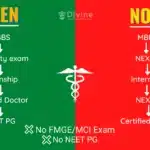Embarking on medical studies abroad is an enriching experience that advances a student’s education and offers personal and professional growth. This guide aims to provide comprehensive insights into international medical schools, covering educational systems, financial planning, cultural adaptation, and the benefits of obtaining a medical degree overseas.
Key Takeaways
- Understanding the differences between MBBS and MD programs is crucial for selecting the right medical education path abroad.
- Financial planning, including scholarships and budgeting, is essential to manage the costs of studying medicine overseas.
- Cultural adaptation enhances learning and leads to better healthcare delivery in diverse medical settings.
- An international medical degree provides a competitive edge and global recognition, broadening career prospects.
- Access to world-class medical curricula and advanced research facilities is a significant advantage of studying medicine abroad.
Navigating the World of Medical Education: Key Destinations

Understanding the Educational Systems
The journey to becoming a doctor is paved with various educational pathways, each unique to its country’s standards and practices. Medical education in India and the United States diverges significantly regarding structure, curriculum, and admission processes. In the USA, for instance, the MD program is a postgraduate degree, whereas in India, the MBBS is an undergraduate program.
It’s essential to understand the credit systems used by medical schools, such as the ECTS in Europe, which standardizes the transfer and accumulation of credits, making international transfers more transparent.
The decision to study medicine abroad is transformative, broadening perspectives and enhancing clinical skills through exposure to diverse healthcare systems.
When considering transfers between medical schools, it’s crucial to recognize that curriculum differences can affect credit alignment and the ability to transfer seamlessly. Here are some key points to consider:
- Each university has its own curriculum and teaching order.
- Credit systems like ECTS facilitate the evaluation of coursework for transfers.
- Accreditation and legitimacy of institutions are non-negotiable for a valid degree.
Understanding these aspects is vital for students to navigate the complex landscape of international medical education and make informed decisions about their academic journey.
Comparing MBBS and MD Programs
When embarking on the journey of medical education abroad, one of the pivotal decisions is choosing between an MBBS and an MD degree. The MBBS (Bachelor of Medicine, Bachelor of Surgery) and the MD (Doctor of Medicine) vary significantly in structure, duration, and global recognition. These differences are crucial for students to consider, as they align with distinct career paths and opportunities.
- MBBS is often a 5.5-year course, including an internship, prevalent in countries like India and the UK.
- MD in the USA is a postgraduate degree, requiring a 4-year undergraduate program, followed by 4 years of medical school.
The choice between MBBS and MD will influence your career trajectory and should reflect your professional aspirations and personal circumstances.
In addition to the educational format, international students must consider the entrance exams and the financial implications of each program. For instance, MBBS programs may require exams like NEET, while MD programs in the USA typically require MCAT scores. Furthermore, the salary prospects for MD graduates are often higher, reflecting the additional years of education and specialization.
Preparing for the Application Process
The application process for international medical schools can be intricate and demanding. Early preparation is crucial to navigate through the various requirements and deadlines. Begin by researching and shortlisting medical schools that align with your career goals and offer programs for international students. Understanding each institution’s specific criteria is essential, as they may vary significantly.
To organize your application tasks effectively, consider the following steps:
- Research and understand the admission requirements for each school
- Prepare for entrance exams and language proficiency tests
- Gather necessary documentation, such as academic transcripts and letters of recommendation
- Craft a compelling personal statement
- Stay aware of application deadlines and submit your materials on time
A strategic approach to the application process enhances your chances of acceptance into a reputable medical program abroad.
Securing expert guidance from academic advisors or consultancy services can be invaluable. They can assist with document preparation, meeting deadlines, and providing insights into what admission committees look for in a candidate. Remember, financial planning and cultural adaptation are crucial for a successful transition to practicing medicine abroad.
Financial Planning for Medical Studies Abroad

Exploring Scholarships and Financial Aid
Securing financial aid is a pivotal step in your journey to study medicine abroad. Scholarships, grants, and loans can significantly reduce the financial burden of tuition and living expenses. Early application is key to accessing these opportunities, as competition can be fierce and deadlines strict.
To streamline your search for financial aid, consider the following steps:
- Research scholarships offered by universities, governments, and private organizations.
- Prepare a compelling application, highlighting your academic achievements and extracurricular involvement.
- Provide proof of financial capability, as some institutions require a bank statement showing sufficient funds.
Proactive engagement with overseas medical education consultants can provide valuable assistance in financial planning and understanding the nuances of scholarship applications.
While the costs of studying medicine abroad can be high, the investment in your future career prospects and global exposure is invaluable. Explore all avenues of financial aid to make your medical education journey more accessible.
Budgeting for Living Expenses and Tuition Fees
When embarking on your medical education journey abroad, budgeting for living expenses and tuition fees is a critical step towards achieving financial stability. The cost of tuition can vary greatly depending on the country and institution, with some universities offering inclusive packages that cover accommodation and other expenses. For example, tuition fees in Georgia’s government universities range from USD 3,000 to USD 7,500 annually, while living costs can average between USD 3,000 to USD 4,500 per year.
Creating a comprehensive budget that includes tuition, accommodation, food, transportation, and other personal expenses is essential. This financial planning will help in making informed decisions about which schools to apply to and how to manage finances throughout the medical program.
In addition to tuition and living expenses, students must consider additional costs such as books, study materials, and health insurance. Here is a succinct breakdown of potential additional costs for students in the USA:
| Item | Cost (USD/academic year) |
|---|---|
| Books and study materials | 400 – 1,000 |
| Health insurance | 700 – 1,100 |
While scholarships and financial aid can significantly reduce the burden, they are highly competitive. It is advisable for students to explore all financial aid options early in their application process. Some medical schools also offer work-study programs to help students finance their education while gaining valuable experience.
Application Tips for International Students
Applying to medical schools abroad requires meticulous planning and attention to detail. Ensure your eligibility by understanding the specific admission requirements of each institution. This may include academic performance, standardized test scores, and language proficiency. Here’s a quick checklist to guide you:
- Passport
- Transcripts from previous education
- Diplomas from prior degrees
- Personal statement essay
- Letters of recommendation
- Resume/CV
- Standardized test scores (e.g., GMAT, GRE, TOEFL, IELTS)
It’s crucial to prepare a strong application package that showcases your strengths and aligns with the university’s expectations.
In addition to academic documents, some universities may require proof of extracurricular activities or work experience. Start early and gather all necessary documents well in advance of application deadlines. Reach out to the admissions office for any clarifications and to understand any country-specific requirements that may apply.
Securing scholarships and financial aid is a critical step in ensuring that your study abroad experience is financially viable. Many educational institutions offer scholarships for students who excel academically but may not have the means to afford higher education costs. It’s essential to read all the terms and conditions carefully and consider scheduling a counseling session to address any doubts or queries.
Cultural Adaptation and Global Exposure in Medical Education

Embracing New Cultures and Healthcare Practices
Studying medicine abroad is a journey that transcends academic learning, offering a unique opportunity for cultural immersion and understanding of diverse healthcare practices. International medical students should make an effort to understand the local customs, traditions, and values. This can be achieved through active engagement with the community and healthcare settings, which not only enriches their medical education but also fosters personal growth.
By embracing the local culture, students gain insights into how cultural nuances influence health outcomes and patient interactions. Additionally, adapting to new healthcare systems requires an openness to learn and the flexibility to integrate different medical approaches. This adaptation is a critical step in becoming a globally competent healthcare professional. Below are key educational opportunities that support this learning:
- Exposure to a diverse patient population
- Training in culturally sensitive communication techniques
- Ethical considerations in a global context
Embracing these experiences enriches the medical journey, equipping students with the skills to excel in a global healthcare environment.
Building a Global Professional Network
In the interconnected world of healthcare, building a global professional network is essential. It’s not just about adding names to a contact list; it’s about forging meaningful relationships that can lead to mentorships, collaborations, and career opportunities. As an aspiring medical professional, your network can offer insights into different healthcare systems, guide you on licensing requirements, and open doors to clinical rotations and residencies abroad.
- Connect with peers, faculty, and professionals at conferences and seminars.
- Engage in international internships and exchange programs.
- Utilize online platforms to join medical communities and forums.
By actively participating in international medical communities, students integrate successfully into the workplace and practice, enhancing their employability and professional growth.
The benefits of studying medicine abroad extend to the professional realm, where students can tap into a rich vein of resources and expertise. This network becomes a valuable asset, providing a foundation for a successful and fulfilling career in medicine.
Access to World-Class Medical Curricula

Global Recognition of Qualifications
Pursuing a medical degree abroad is not just about acquiring knowledge; it’s about embracing a transformative journey that culminates in a qualification that enjoys global recognition. Medical degrees from accredited universities are widely acknowledged, allowing graduates to practice in various countries and enhancing their career prospects.
The seamless recognition of an overseas medical degree is a testament to the quality of education provided. Graduates are often seen with a competitive edge in the job market, as their qualifications reflect adaptability and a commitment to global healthcare standards.
- Accreditation: Ensure the medical program is recognized by relevant medical councils.
- Quality of Education: Research the reputation and teaching standards of the university.
- Competitive Edge: An overseas degree demonstrates adaptability and commitment.
Studying medicine abroad offers world-class education, career growth, financial success, and global recognition. Support systems and faculty excellence enhance the transformative experience for future healthcare leaders.
Advanced Research Facilities and Innovation
International medical schools are renowned for their advanced research facilities and commitment to innovation. These institutions provide students with the opportunity to work alongside leading experts in state-of-the-art environments, contributing to groundbreaking medical advancements.
Experiential learning is at the core of these programs, with students gaining hands-on experience in a variety of specialized fields. From neurogenetics to regenerative medicine, the scope for research is vast and dynamic. Here are some of the key benefits students can expect:
- Access to pioneering research institutes and specialties
- Opportunities to engage in complex surgical procedures and innovative treatments
- Independence in choosing research rotations aligned with personal interests
In these hubs of scientific discovery, students not only enhance their academic credentials but also prepare for impactful careers in medicine.
Achieving Your MBBS Degree Abroad: A Gateway to Global Opportunities

Bachelor Degree in Medicine in the USA: A Step Towards Your Medical Career
Pursuing a Bachelor degree in medicine in the USA is a significant step for international students aiming to carve out a successful career in the medical field. The journey from MBBS to MD is marked by a rigorous educational pathway that demands strategic academic planning and a deep understanding of the eligibility criteria and application processes involved.
Studying MBBS abroad offers diverse opportunities, faculty excellence, research initiatives, and global recognition for medical students. It’s essential to navigate the complexities of the US medical education system with meticulous preparation to achieve your aspirations of becoming a globally recognized physician.
The transition from MBBS to MD involves not only academic preparation but also adapting to a new educational and cultural environment.
Here are some key steps for Indian students considering this path:
- Ensure you meet the academic and language proficiency requirements.
- Complete necessary pre-medical coursework.
- Prepare for and take exams such as the MCAT.
- Gain clinical exposure to enhance your application.
- Understand the costs involved and explore scholarship and funding options.
Medical Schools That Accept International Students
The journey to becoming a global medical professional often begins with the crucial step of gaining admission to a medical school that welcomes international students. Explore pathways, academic planning, and opportunities for obtaining an MBBS degree abroad. This not only ensures a quality education but also provides invaluable global exposure and the chance to unlock global opportunities in the medical field.
While many medical schools offer excellent programs, only a select few open their doors to international candidates. It’s imperative to verify the latest admissions information directly from the schools’ official websites or through resources like the MSAR database. Below is a non-exhaustive list of countries known for their medical schools that accept international students:
- United States
- Canada
- United Kingdom
- Australia
- Caribbean
Financial constraints and location can be significant hurdles, yet they are not insurmountable. Proactive research and application for scholarships can pave the way for a successful medical education journey abroad.
Italics are used for emphasis on the importance of verifying admissions information, as it is subject to change. The list provided offers a starting point for where to look, but it is by no means comprehensive. Aspiring medical students should conduct thorough research to find the best fit for their educational and professional goals.
Embarking on your journey to become a globally recognized doctor starts with the right education. Achieving your MBBS degree abroad opens a world of opportunities, and Divine Education Abroad Consultancy is your trusted partner in this quest. Our Fast-Track MD Pathway program is designed to bypass traditional barriers like the MCAT and NEET, offering a direct, affordable, and successful route to becoming a US-qualified doctor. Don’t let uncertainty hold you back. Visit our website now to learn more about our programs, scholarships, and personalized guidance that can transform your medical career aspirations into reality. Take the first step towards a rewarding future in medicine with Divine Education Abroad Consultancy.
Conclusion
As we conclude our guide on ‘Medical Admission Abroad: Your Guide to International Medical Schools,’ it’s clear that embarking on medical studies in a foreign country is a significant but rewarding endeavor. It offers access to world-class education, exposure to diverse healthcare systems, and the opportunity to join a global professional network. While challenges such as financial planning, cultural adaptation, and navigating admission processes exist, the benefits of broadened horizons, advanced research facilities, and international recognition of qualifications are profound. Aspiring medical students should thoroughly research their options, plan strategically, and utilize available resources to make informed decisions. With dedication and the right approach, studying medicine abroad can be a transformative journey that sets the stage for a versatile and fulfilling medical career.
Frequently Asked Questions
What are the key destinations for medical education abroad?
Key destinations for medical education abroad include the USA, UK, Australia, Canada, and several European countries such as Germany, France, and the Netherlands. These countries are known for their high standards, advanced facilities, and global recognition of qualifications.
How can I finance my medical studies abroad?
You can finance your medical studies abroad through scholarships, grants, loans, and work-study programs. It’s important to research and apply early for financial aid opportunities offered by universities, governments, and private organizations.
What challenges can I expect when applying to medical school as an international student?
Challenges include navigating different educational systems, managing the cost of education, securing financial aid, meeting prerequisites, cultural adaptation, language barriers, and the competitive nature of the application process.
How do MBBS and MD programs differ internationally?
Internationally, the MBBS (Bachelor of Medicine, Bachelor of Surgery) is an undergraduate program offered in countries like the UK and India, while the MD (Doctor of Medicine) in the USA is a postgraduate degree that requires prior completion of an undergraduate program.
Are there medical schools in the USA that accept international students for MBBS programs?
In the USA, the equivalent of an MBBS program is an MD program, and there are medical schools that accept international students for MD programs. However, the acceptance criteria and process can be highly competitive.
What are the benefits of studying medicine abroad?
Studying medicine abroad offers access to world-class curricula, exposure to diverse healthcare systems, cultural immersion, global professional networks, and improved career prospects with an internationally recognized medical degree.














